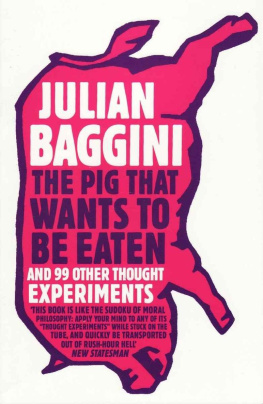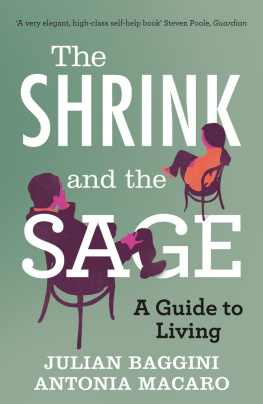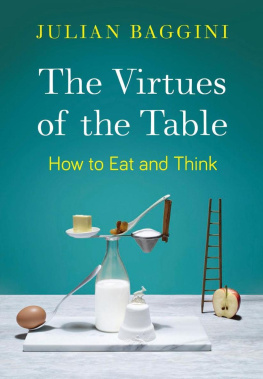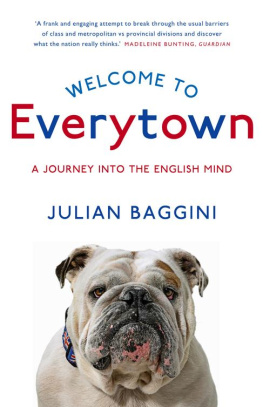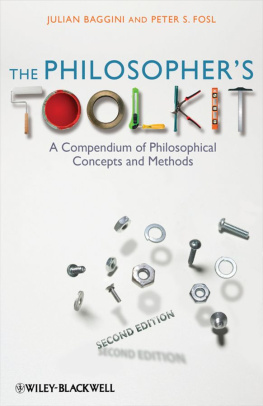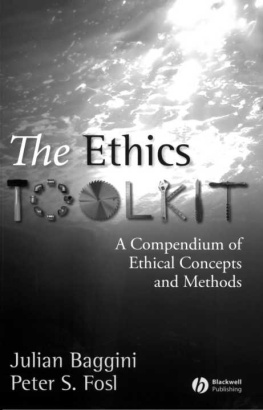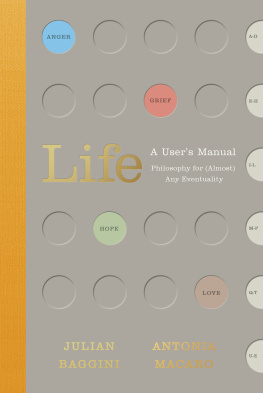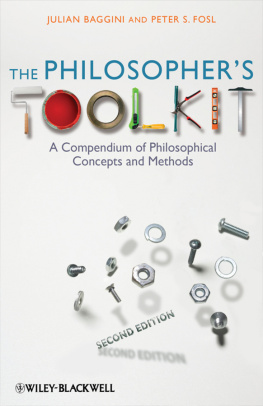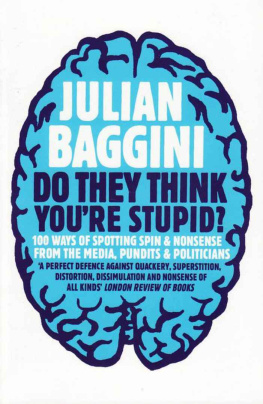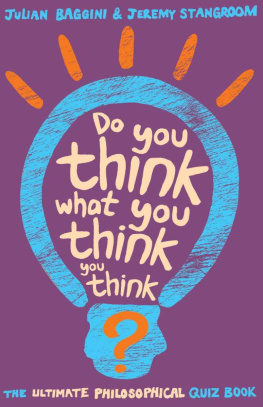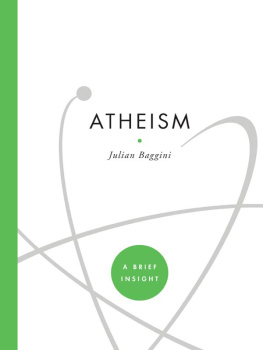Brought to you by KeVkRaY
From the reviews of The Pig That Wants to be Eaten :
Examines received opinions, things we take for granted, and dissects them entertainingly The Times
Baggini offers us a tempting smorgasbord of some of the most baffling, weird and occasionally downright creepy scenarios ever envisaged enjoy these mind-boggling tales from the outer limit of thought Guardian
Written in a breezy and accessible style as fabulous, and entertaining, as a fairy story or a horror film It can be unnerving stuff, and all the better for that These thought experiments are designed to encourage people to reason clearly about important matters, a kind of reasoning often lacking from todays public discussions thinking on the edge, though not easy, is both necessary and, for this reader at least, fun New Humanist
Baggini frames various philosophical conundrums so that we focus on the nub of the matter without the extraneous considerations that complicate them in real life helpfully cross-referenced and ideal for reading aloud Metro
A remarkably addictive read, like a bag of mental fun-size treats Big Issue
The Pig That
Wants to Be Eaten
And ninety-nine other thought
experiments
Julian Baggini
GRANTA
Table of Contents
Preface
Imagination without reason is mere fancy, but reason without imagination is sterile. That is partly why scientists and philosophers alike have always used imaginary scenarios to help sharpen their ideas and push them to their limits. The purpose of such thought experiments is to strip away the things that complicate matters in real life in order to focus clearly on the essence of a problem.
So, for example, a real-life ethical dilemma will always be complicated by contingent, context-specific factors. Take the general issue of whether eating meat is morally wrong. If you consider whether it is wrong to eat the meat you have an opportunity to consume, multiple factors come into play. Some animals will have been factory farmed, some humanely reared, some caught wild. Some animals will have been raised on land that was once rainforest, others will have freely grazed on open pastures. Some meat will be organic, some will be genetically modified, some will have been shipped from the other side of the world. Deciding the ethical rights and wrongs requires untangling all these multiple factors, and weighing up the different considerations accordingly.
Thought experiments can help because, like scientific experiments, they aim to isolate the key variables, the specific factors under examination, to see what difference they, and they alone, make to our understanding of the world. So if we want to consider the ethics of eating animals we can imagine situations in which the particular issue of concern is the only one to differ between two scenarios. If were worried about how we treat farm animals, let us imagine what difference good treatment, and good treatment alone, makes. If our intentions are under scrutiny, we can ask what difference does it make if the chicken in your kiev died in an accident whereas mine had its neck wrung intentionally, but before that they had lived identical lives. We can simply stipulate that all other things are equal, so the only question we need to settle is the core moral one.
Thought experiments do not just have the advantage of being tidier than real life. They can actually help us think about things that we could, or would, not test in real life. Sometimes they require us to imagine what is impractical or even impossible, either for us right now or for all people at all times. Although what these experiments ask us to consider can seem outlandish, the purpose is the same as for any thought experiment: to keep our focus on one core concept or problem. If an impossible scenario helps us to do that, then its impossibility need not concern us. The experiment is merely a tool to aid our thinking, it does not pretend to describe actual life.
The 100 scenarios in this book are inspired mostly, but not always, by the arguments of philosophers. Sometimes they take assumptions we rarely question and turn them upside down. Sometimes they suggest ways of resolving what seem to be intractable problems. And sometimes they make us see problems which dont seem like problems at all until you follow through their implications.
This is neither a reference book nor a collection of answers to old puzzles; it is rather a provocation, a stimulus to further thought. In the comments that follow the scenarios, I may suggest a way out of the difficulty or I may be playing devils advocate: it is for you to decide which.
Similarly, the cross-referencing is intended to be suggestive, not scientific. Sometimes the connections between the scenarios will be obvious. On other occasions the link is itself a means of making you look at the problem in a new light.
Many lines of thought can be started from this book. But none ends in it.
A note on sources
Where there are one or more identifiable sources for an experiment, I have included details of them at the end of the scenario. It should be noted, however, that although my versions are sometimes very similar to those in the source material, on other occasions they are very different. Readers should therefore assume that these sources provide no more than the inspiration for the scenarios in this book.
Where no source is given, it is usually because the thought experiment is inspired by a wider debate in which no one or two sources can be singled out. It should not be taken necessarily to indicate originality on my part.
Some of these scenarios may have sources of which I am unaware and have therefore not credited. I would be happy to rectify any such omissions in any future editions.
The evil demon
Is anything so self-evident that it cannot be doubted? Is it not possible that our lives are no more than dreams, or that the world is just a figment of our imaginations? Outlandish though these notions are, the mere fact that they are conceivable shows that the reality of the physical world can be doubted.There are other ideas, however, which seem to be so clear and self-evident that they must be true. For instance, whether you are awake or asleep, two plus two makes four. A triangle must have three sides whether the world, real or imaginary, contains triangles or not.But what if God, or some powerful, malicious demon, is tricking you? Couldnt such an evil spirit fool you into believing that the false is obviously true? Havent we seen hypnotists make people count to ten, unaware that they have missed out the number seven? And what of a man who, in a dream, hears four strikes of the clock tower bell and finds himself thinking, How odd. The clock has struck one four times!If the evil demon is a possibility, is there anything which is beyond doubt? Source: The first meditation from Meditations by Ren Descartes (1641)

Philosophers have a habit of finding something we think we all know and then providing reasons for making us doubt we know it after all. Laws of nature, the physical world, God, goodness, other minds, justice, time philosophers have found reasons to doubt them all.
In order to advance such profoundly sceptical arguments, the philosopher needs to use the one thing he cannot afford to doubt: his own capacity to think rationally. So, for example, the reality of time can be doubted because the traditional concept of time contains contradictions. These contradictions involve a violation of basic logical principles, such as the impossibility of both being and not being at the same time. It is the ability to recognise that these are logical contradictions that allows the philosopher to reason and justify his doubt.
But if we were under the influence of a powerful deceiving demon, a possibility first proposed by the seventeenth-century French philosopher Ren Descartes, then we might be wrong to take these basic logical principles to be true. It may seem to us that they are obvious and self-evident, but to the person under hypnosis it may seem obvious and self-evident that eight follows six. To the deluded dreamer it may seem obvious and self-evident that the clock has struck one selfaggrandising four times, when we all know it has actually struck four oclock once.
Next page
